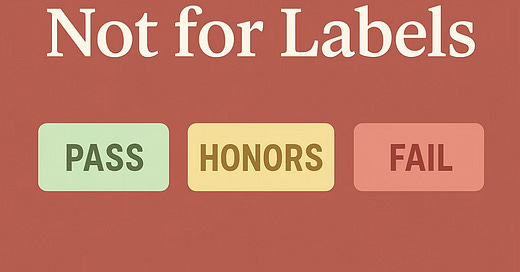When I studied at the London School of Economics back in 1989-90, I encountered a simple grading system: Pass, Honors, or Fail. At the time, I was struck by its elegance and wisdom. There were no GPA battles, no anxious rankings, no stress over a decimal point separating classmates. Just a clear signal: Did you understand the material, and did you engage with it meaningfully?
To this day, I believe that system—rooted in clarity, maturity, and trust in students—is superior to the American model we still use, one that continues to fracture learning into arbitrary numbers and letters, fueling competition, stress, and inequity.
The recent uproar in San Francisco over an attempt to reform grading is a revealing case in point.
Earlier this month, the San Francisco Unified School District (SFUSD) quietly introduced a voluntary pilot program aimed at aligning grades more closely with student learning—not with behavior, attendance, or compliance. The intent was simple and noble: ensure that grades reflect what students know and can do, not whether their parent signed a permission slip or if they remembered to bring canned goods for a food drive.
But once the media and some public officials misunderstood and mischaracterized the initiative, outrage followed. Within days, the district backed off. The program was killed before it had a chance to breathe.
Let’s be clear: this wasn’t about “lowering standards” or “giving A’s for 80% and no homework,” as some critics claimed. The heart of the Grading for Equity approach, developed by educator Joe Feldman, is to give students multiple opportunities to demonstrate mastery, to acknowledge that one zero shouldn’t doom an entire grade, and to empower teachers with better tools to assess learning consistently.
In truth, America’s traditional 100-point scale is deeply flawed. It gives the “F” range—0 to 59—six times the weight of any passing grade. One missed assignment can sabotage a student’s entire semester. It’s a system designed more for sorting than for understanding.
As a teacher and coach, I see the cost of this every day. Students who learn differently, who face challenges at home, who need more time—all too often fall behind not because they’re incapable, but because our grading system mistakes efficiency for intelligence and compliance for character.
What if we reimagined grading as feedback rather than judgment? What if, like in the British system I experienced, we asked only: Did you pass? Did you excel? Or do you need to try again?
Grades should be a flashlight, not a hammer. They should illuminate learning, not crush it.
To critics who say these reforms are about coddling students, I say this: Nothing is more rigorous than truly understanding what a student knows and helping them build from there. It takes courage, not softness, to believe in every learner’s potential—and to design systems that meet them where they are.
Education should be about mastery, not ranking. About growth, not punishment. About purpose, not point accumulation.
It’s time to end the tyranny of the gradebook and return to what matters: learning.
Let’s open the conversation—not shut it down.




